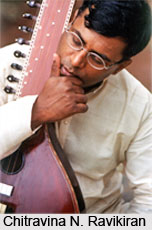 Chitravina N. Ravikiran, born on 12th February in the year 1967 in Mysore in the Indian state of Karnataka, is one of India`s most celebrated slide-instrumentalist, Carnatic music performer, composer, Guru, and creator of the novel concept of Melharmony. He is the grandson of famous musician Gottuvadyam Narayan Iyengar.
Chitravina N. Ravikiran, born on 12th February in the year 1967 in Mysore in the Indian state of Karnataka, is one of India`s most celebrated slide-instrumentalist, Carnatic music performer, composer, Guru, and creator of the novel concept of Melharmony. He is the grandson of famous musician Gottuvadyam Narayan Iyengar.
Life of Chitravina N. Ravikiran
Hailed as the Mozart of Indian Music, Ravikiran made his first appearance at the age of two in 1969. Soon after that he was presented in The Madras Music Academy, Krishna Ghana Sabha he was able to identify and render about 325 ragas (melodic scales) and 175 talas (rhythmic cycles). He was quizzed by famous musicians such as Semmangudi Srinivasa Iyer, Pt Ravi Shankar, M S Subbulakshmi and others. The Music Academy, Madras, awarded the two-year-old, a monthly scholarship for the next few years. Ravikiran trained in Carnatic music under the guidance of his father, Narasimhan. Ravikiran debuted as a vocalist in 1972, at Coimbatore at the age of five years. At the age of 10, he switched over to the 21-stringed chitravina. From 1986-96, Ravikiran had the rare privilege of learning from the celebrated vocalist T.Brinda, widely acknowledged as a musicians` musician. His interaction with her added a whole new dimension to his perception of the microscopic nuances of music.
Ravikiran is the author of several books, Appreciating Carnatic Music and Perfecting Carnatic Music Level I and II. He is also the founder of the International Foundation for Carnatic Music
This article is a stub. You can enrich by adding more information to it. Send your Write Up to content@indianetzone.com




















